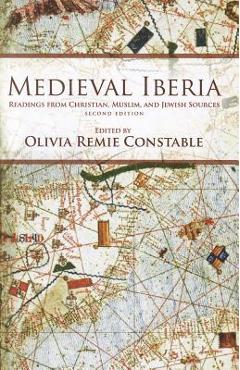Medieval Iberia, Second Edition: Readings from Christian, Muslim, and Jewish Sources - Olivia Remie Constable

Detalii Medieval Iberia, Second Edition: Readings
libris.ro
418.15 Lei
464.61 Lei
History
Olivia Remie Constable
Medieval Iberia, Second Edition: Readings - Disponibil la libris.ro
Pe YEO găsești Medieval Iberia, Second Edition: Readings de la Olivia Remie Constable, în categoria History.
Indiferent de nevoile tale, Medieval Iberia, Second Edition: Readings from Christian, Muslim, and Jewish Sources - Olivia Remie Constable din categoria History îți poate aduce un echilibru perfect între calitate și preț, cu avantaje practice și moderne.
Preț: 418.15 Lei
Caracteristicile produsului Medieval Iberia, Second Edition: Readings
- Brand: Olivia Remie Constable
- Categoria: History
- Magazin: libris.ro
- Ultima actualizare: 05-06-2025 16:21:01
Comandă Medieval Iberia, Second Edition: Readings Online, Simplu și Rapid
Prin intermediul platformei YEO, poți comanda Medieval Iberia, Second Edition: Readings de la libris.ro rapid și în siguranță. Bucură-te de o experiență de cumpărături online optimizată și descoperă cele mai bune oferte actualizate constant.
Descriere magazin:
For some historians, medieval Iberian society was one marked by peaceful coexistence and cross-cultural fertilization; others have sketched a harsher picture of Muslims and Christians engaged in an ongoing contest for political, religious, and economic advantage culminating in the fall of Muslim Granada and the expulsion of the Jews in the late fifteenth century. The reality that emerges in Medieval Iberia is more nuanced than either of these scenarios can comprehend. Now in an expanded, second edition, this monumental collection offers unparalleled access to the multicultural complexity of the lands that would become modern Portugal and Spain. The documents collected in Medieval Iberia date mostly from the eighth through the fifteenth centuries and have been translated from Latin, Arabic, Hebrew, Judeo-Arabic, Castilian, Catalan, and Portuguese by many of the most eminent scholars in the field of Iberian studies. Nearly one quarter of this edition is new, including visual materials and increased coverage of Jewish and Muslim affairs, as well as more sources pertaining to women, social and economic history, and domestic life. This primary source material ranges widely across historical chronicles, poetry, and legal and religious sources, and each is accompanied by a brief introduction placing the text in its historical and cultural setting. Arranged chronologically, the documents are also keyed so as to be accessible to readers interested in specific topics such as urban life, the politics of the royal courts, interfaith relations, or women, marriage, and the family.

Produse asemănătoare

Medieval Iberia, Second Edition: Readings from Christian, Muslim, and Jewish Sources - Olivia Remie Constable
![]() libris.ro
libris.ro
Actualizat in 05/06/2025
418.15 Lei
Produse marca Olivia Remie Constable

Medieval Iberia, Second Edition: Readings from Christian, Muslim, and Jewish Sources - Olivia Remie Constable
![]() libris.ro
libris.ro
Actualizat in 05/06/2025
418.15 Lei